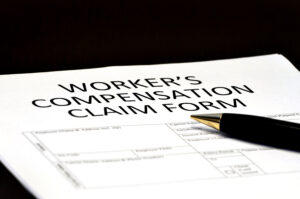 Sustaining an injury or an illness at work can be scary and overwhelming. You often have no idea what steps to take and who to turn to for help after dealing with a workplace accident. Luckily, employees who get injured or become sick while working for their employer may be entitled to file a workers’ compensation claim. A workers’ compensation or workers’ comp is an insurance program giving injured employees or become ill in the workplace monetary assistance to cover their medical expenses and lost wages.
Sustaining an injury or an illness at work can be scary and overwhelming. You often have no idea what steps to take and who to turn to for help after dealing with a workplace accident. Luckily, employees who get injured or become sick while working for their employer may be entitled to file a workers’ compensation claim. A workers’ compensation or workers’ comp is an insurance program giving injured employees or become ill in the workplace monetary assistance to cover their medical expenses and lost wages.
However, if you’re a first-time employee, you should know that understanding a workers’ comp claim isn’t just knowing its coverage. Without proper knowledge about this matter, you may end up facing problems when you get injured and want to file a compensation claim.
For a first-time employee like you, below are the four things you should know about a workers’ compensation claim:
- Filing A Workers’ Comp Claim Means Waiving Your Right To File A Lawsuit
It is a thing a first-time employee like you should know about a workers’ comp claim. This type of claim intends to finance the medical costs and lost wages sustained due to the workplace injury or illness, regardless of who is at fault. Hence, when you decide to institute a workers’ comp claim, you lose your right to file a personal injury lawsuit to recover compensation. It means you can’t use both remedies simultaneously for your workplace injury.
 On the other hand, if you strongly believe that your injury is due to someone else’s negligence, filing a lawsuit in court is much better than filing a workers’ comp claim. It is because you can hold the at-fault party who can be your employer, colleague, or a third-person liable for your losses. But, when you consider pursuing a lawsuit, it’s best to hire a dedicated lawyer. In doing so, you need to familiarize yourself with how much does it cost to sue your employer. That way, you’re aware of the fees to pay, and you can ensure you’re not overwhelmed by the thought of filing a case.
On the other hand, if you strongly believe that your injury is due to someone else’s negligence, filing a lawsuit in court is much better than filing a workers’ comp claim. It is because you can hold the at-fault party who can be your employer, colleague, or a third-person liable for your losses. But, when you consider pursuing a lawsuit, it’s best to hire a dedicated lawyer. In doing so, you need to familiarize yourself with how much does it cost to sue your employer. That way, you’re aware of the fees to pay, and you can ensure you’re not overwhelmed by the thought of filing a case.
- Specific Injuries And Illness Are Covered By Workers’ Comp Claim
It’s crucial to understand that workers’ comp claim doesn’t cover all forms of injuries and illness. Generally, under the workers’ compensation program, employees who get injured while doing their job, whether onsite or offsite, are eligible to file a claim against the employer’s insurance provider. Aside from the work-related injuries, occupational diseases developed during an employee’s employment are also included in the coverage. Common occupational illnesses are carpal tunnel and any health issues caused by toxic chemical exposure.
On the other hand, your workers’ comp claim will not be successful if your injury or illness complained of is included in the following exclusions:
- Self-inflicted injuries;
- Injured sustained due to fighting against another employee;
- Injured suffered while committing a crime, violating company policies, or under the influence of drugs.
- A Workers’ Comp Claim Doesn’t Compensate Non-Economic Damages
Unlike a personal injury lawsuit, instituting a workers’ comp claim doesn’t allow you to recover non-economic damages or those which don’t have a specific monetary value. These can include pain and suffering, emotional distress, loss of enjoyment in life, and other similar situations. Since the workers’ compensation is limited only to medical and wage replacement benefits, filing a claim on the ground that you’ve experienced anxiety, depression, and pain and suffering may not prosper.
Thus, if you want to get compensated for the full extent of your losses, including economic and non-economic damages, bringing a claim under the workers’ comp insurance program may not be the best option. But, to help you decide which legal course of action you should take after sustaining an injury at work, it’s best to consult a lawyer about your situation.
- The Injured Employee Should Report The Injury To The Employer
Another thing you should learn about filing a workers’ comp is the injured employee should report the injury sustained as quickly as possible to the employer. Generally, reporting is one of the essential steps in the filing process. Failing to do so may adversely impact the claimant’s chances of winning the claim.
Like the time limits you have within which you need to file your claim, you need to be wary of the deadline associated with reporting. In most cases, the deadline ranges from 30 days to 60 days, depending on what state you come from. Unable to notify your employer within the said period may not be favorable for your situation. Hence, when you’ve decided to file a workers’ comp claim, you should educate yourself about the reporting deadlines to ensure a successful outcome later.
Bottom Line
As a first-time employee, your confusion and lack of knowledge about the workers’ compensation claim are understandable. But, as you work for your employer, it’s essential to keep the information mentioned above in mind to understand workers’ comp and how it works. That way, you’ll know what to do should you get injured or become ill in the workplace.


